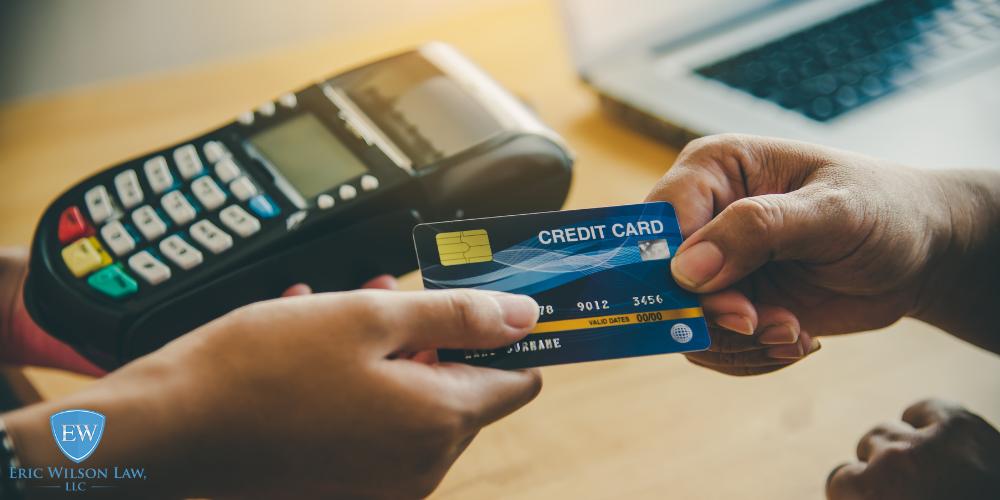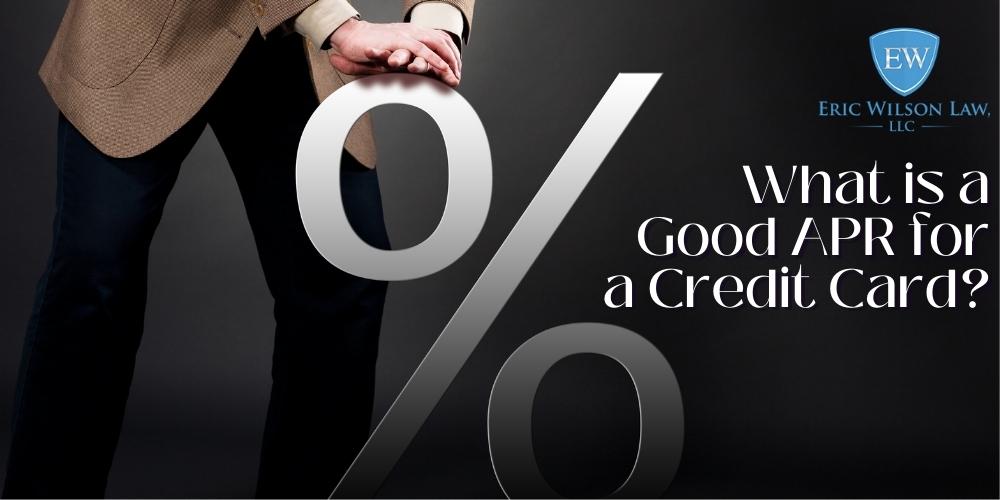Oftentimes, credit card interest rates can make or break a person’s financial situation. The reason why so many people get stuck in an endless cycle of credit card debt is because of the high interest rates on all of their credit card accounts. This may leave you wondering: what is a good APR for a credit card? The exact answer can vary depending on the month or the year. And, it’s important to remember, that not all credit cards are created equal when it comes to interest rates. Generally though, a good credit card APR is one that falls below the national average APR. Below, we explain what a good credit card APR is, as well as how to qualify for a better APR than you currently have.
If you’re struggling with credit card debt and/or poor credit, Eric Wilson is here to help you. Call 205-349-1280 to schedule a free consultation today.
What is APR?
Annual percentage rate, or APR, is the annual interest created by an amount of money. This interest is charged to borrowers of that money for the sake of repaying investors, lenders, credit card companies, etc. APR is basically the amount of money charged for a type of loan, or it’s earned wages by an investment.
Most people recognize the term “annual percentage rate” in reference to credit cards. When we’re talking about credit cards, APR and interest rate basically mean the same thing. When you have an outstanding credit card bill every month, you will likely get charged interest fees, which can keep you in a never ending cycle of credit card debt for years. That’s why so many people turn to 0% interest or low interest credit cards in an attempt to get their debt under control.
What is a Good APR For a Credit Card?
So – what is a good APR for a credit card? Well, ideally, the best credit card APR is 0%, but this is not a long-term thing. Low interest credit cards offer a 0% interest rate for an introductory period of only 6 months to a year. Getting a low interest credit card with a 0% balance transfer fee can be a great tool to pay off debt via credit card refinancing, which is where you transfer all (or the majority) of your debt onto the 0% interest card in order to pay it off sooner without interest charges. With this debt relief method, you won’t be charged interest on your existing balance or any balance transfers for the promotional period.
But the real answer to this question is anything lower than the current national average credit card APR. According to data from the Federal Reserve, the national average interest rate for credit cards was around 16% in the second quarter of 2022. So any credit card interest rate under about 16% is considered good right now. But good credit card APRs can definitely change overtime based on whether the Federal Reserve continues raising the national interest rates.
Benefits of Having a Low Credit Card Interest Rate
The biggest benefit of having low credit card interest rates is being able to pay off your credit card balance sooner than later. Little to no interest charges can save you potentially thousands of dollars in the long run. Not only that, but low interest credit cards can lead to a higher credit score. In short: the more you keep your credit card debt paid down, the better your credit will be, and the more money you’ll save.

What Makes Up Credit Card APR?
So, what determines your credit card’s APR? Multiple factors make up credit card APR, including:
- Your Creditworthiness: If your credit report or credit score is suffering in any way, your credit card APR may reflect that. A higher credit score can result in a lower APR on your credit card.
- Your Credit Card’s Interest Rate Range: Each credit card issuer may have different tiers – or a specific range – of potential interest rates that they can offer to credit card users.
- The Benchmark Interest Rates: Some credit unions or credit card issuers have a variable APR. This means that your credit card interest rate can go up and down throughout the course of several months or years. Variable APRs are connected to the federal prime rate, which is basically the lowest interest rate that someone can borrow money from a credit union or other lender.
- The Type of Transaction: Credit card interest rates can vary significantly for regular purchases, cash advances, and balance transfers. Some credit cards even have a penalty APR if you have a late or missed payment. Most people focus on having a low APR for purchases, which is definitely important, but it’s good to be aware of the varying APRs for different types of transactions as well.
How to Qualify for a Better Credit Card APR
Listed below are the best ways to possibly qualify for a good credit card APR:
- Boost Your Credit Score: People with a good to excellent credit score are most likely to get the best, lowest credit card APRs. If you’re desperately trying to achieve a good credit score after struggling with debt or filing for bankruptcy, Eric Wilson can help. He has decades of experience in not only helping people become debt free through bankruptcy, but also helping people fix their credit report after bankruptcy.
- Compare Credit Card APRs: Be sure to shop around for the best credit card APR before you make a decision. We all see the credit card ads from the major credit card companies and major banks, but what you may not realize is that smaller credit unions may offer a lower APR. A credit card account from a smaller credit union may result in less points and benefits, but if the APR is low, you’re not missing out on too much.
- Look for 0% Introductory APR: Comparing credit cards to see which one has the best introductory interest rate can go a long way for your overall financial situation. Many credit cards offer a deal where you can get 0% interest on purchases and balance transfers for up to 1 year. With a deal like this, you could definitely pay off your credit card debt quicker.
- Negotiate With Your Current Credit Card Issuer: People with good credit reports and good credit scores may be able to ask their credit card issuer for a lower APR. Most of the time, credit card issuers don’t show much mercy to people who are struggling with their finances, even if it’s just temporary. But still, negotiation is always worth a shot if you’ve exhausted your other options.
How to Avoid Credit Card Interest Entirely
There are ways to avoid interest on credit card payments altogether. Consider implementing the practices listed below so that you can keep your monthly interest – and credit card debt – to a minimum.
Pay Your Entire Credit Card Balance
It’s easier said than done, but do your best to pay off your credit cards in full every single month. This is the best way to avoid paying interest on credit cards. Some people believe that if they carry a balance on their card every month, they will reap the benefits via a higher credit score. This is incorrect. Yes, using and paying your credit card does improve your credit score, but carrying a balance – and therefore, accruing interest – month after month is the best way to get yourself into a debilitating cycle of debt.
Budget Your Money to Avoid Overspending
The best way to keep overspending to a minimum is by setting up a strict monthly budget for yourself. Make sure to budget enough of your monthly income for your rent, gas, groceries, health insurance, and any debts. But make sure to give yourself a little “fun” money too, if you can of course. Completely cutting yourself off from the small joys in life can easily lead you down a path of overspending just because you’ve gone so long restricting yourself.
With a set budget in place, you can easily see where all your money goes, and learn to be more financially responsible. In the long run, this can help you pay down your credit card balances and avoid accruing tons of interest charges.
Pay Early to Potentially Boost Your Credit Score
Sometimes, it can be difficult to budget for and foresee any large expenses that you may have to put on your credit card. This can make it difficult to know how much money to put aside for your monthly payments on your credit cards. To potentially solve this problem, you can pay your credit card bill early every month (or some months) so your breath won’t be taken away by such an astronomical bill at the end of the month.
Making early payments may even boost your credit score. Why? Because the lower balance can lead to a lower credit utilization ratio. Your credit utilization ratio – along with on time payments, credit mix, and more – holds a lot of weight in how high or low your credit score is. In fact, it makes up about 30% of your credit score. So making early payments could definitely benefit you in more ways than one.

Call a Tuscaloosa Bankruptcy Lawyer at Eric Wilson Law Today
If you’re looking to be freed from the crushing weight of debt, save money, and fix your credit report, Eric Wilson is the best resource to have on your side. He has more than 25 years of experience in helping his clients live happier lives through the benefits of a Chapter 7 or Chapter 13 bankruptcy filing. Call 205-349-1280 to schedule a free consultation today.


